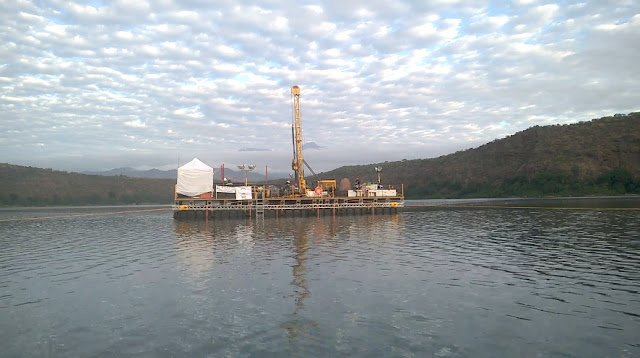 |
| The DeepCHALLA UK party at the BGS plus International lead investigator Dirk Verschuren (Ghent University) |
The sediment cores were retrieved from Lake Challa, a crater lake found 3 degrees south of the equator, on the eastern flank of mount Kilamanjaro, and which lies directly on the border of Tanzania and Kenya. The region is subject to two rainy seasons a year, but the length in between these seasons is changed over thousands of years as the Earth changes it orbit of the Sun, and has led to periods of aridity and drought. In particular, around 110-160 thousand years ago, it is believed that mega-droughts which lasted thousands of years at a time, led to the dispersal of our hominin ancestors out of Africa and caused vegetation changes leading to the high biodiversity of the region today.
 |
| The DeepCHALLA drilling rig on the lake |
Ice cores from the north and south poles have provided incredible climate reconstructions which have been used to predict future changes to our global climate. However, past climate change in equatorial regions is still relatively unknown. This project will help broaden our perspective of climate change in a region which has suffered droughts and severe food shortages in recent years, and will help modellers to predict future weather patterns here. Furthermore, this lake sediment record is unique because it extends to a period so far back in time that we can test our theories about why our ancestors migrated out of the continent.
 |
| A diatom from Lake Challa that will be analysed to reconstruct 250,000 years of climate history in equatorial east Africa |
This exciting project will begin with a sampling party in Ghent in June, where we will collect all the mud we need to undertake our analyses. Watch this space for how our project progresses and what interesting stories our data may tell us. We would like to thank ICDP, NERC and Dirk Verschuren and colleagues from Ghent University for their hard work in retrieving a successful sediment record to work on and organising the sampling party.
Heather is a post doctoral research assistant on the NERC funded grant based at Lancaster University.

Comments